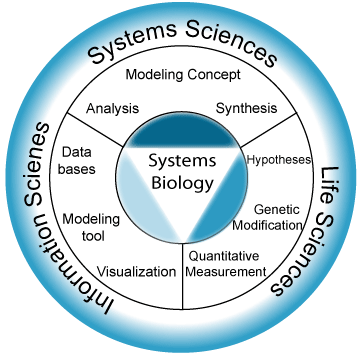Systems Biology is the study of biological components, such as molecules, cells, organisms or entire species. To be able to understand biology at the System level it is necessary to examine the structure and dynamics of cellular and organism function.It can also be called as a computational and mathematical modeling of complex biological systems.According to Ann Neurol “Systems biology and its application to the understanding neurological diseases” Systems Biology is field that employs tools developed in physics and mathematics such as nonlinear dynamics, control theory and modeling of dynamic systems .
The purpose of systematic biology is to answer questions related to complexity of living systems such as genomics. This is an engineering approach which is now applied to bio-medical and biological scientific research. Properties of systems emerge as central issues, and understanding these properties may have an impact of the future of medicine. Although systems biology is a relative new field, it is expected to revolutionize the understanding of complex biological regulatory systems and to provide major new opportunities for practical application of such knowledge.
The volume of information is overwhelming and the language of communication between the interactive parts of our organism is unknown. In order to better treat disease, we have to understand the principles that govern the design, function and interaction of these systems. Then we can ask what happens when there is a malfunction. Tracking networks of genes and proteins responsible for the processing of the information of cells which involves monitoring hundreds and thousands genes and cells communication channel simultaneously. So first collect the data and then analyze. SB takes a holistic approach.
A system understanding of biological systems can be derived from four different areas.
- Systematic structures: Includes the network of gene interactions and biochemical pathways
- Systems dynamics : Observes how a system behaves over time under various conditions
- Control method: Mechanism which controls the behavior of the cell and can reduce malfunctions and provide potential therapeutic targets for treatment disease.
- Design method: Strategies to modify and construct biological systems having desired properties can be devised based on definite design principles and simulations.

Fig1. Hypothesis-driven research in systems biology.The model represents a computable set of assumptions and hypothesis that need to be tested or supported experimentally\
Application of Systems Biology
The most common application of SB is to create detailed model of cell regulation focused on particular signal-transduction cascades and molecules to provide system-level insights into mechanism-based discovery.
“Systems biology is the in-between. It’s those new properties that arise when you go from the molecule to the system. It’s different from physiology or holism and it’s different from reductionist things like molecular biology. It’s the in-between.”
–Hans V. Westerhoff, PhD
http://sysbio.med.harvard.edu/welcome-to-the-department-of-systems-biology-hms
Systems Biology researches
Prof Uri Alon investigates how cells make decision and process information to enable the creation of proteins and his goal is to develop a blue print of a living cell. He developed a tracking system that enables him to monitor in real time the simultaneously expression of multiple genes in living cells. He discovered that the biochemical circuit in the cell is much simpler because it is composed of repeated circuit patterns called network motifs and eventually each network motif performs a specific information process task. His maps are really helpful and revolutionary.
http://wws.weizmann.ac.il/mcb/UriAlon/research/network-motifs
http://sysbio.med.harvard.edu/slide-show-items/assembling-cancer-networks